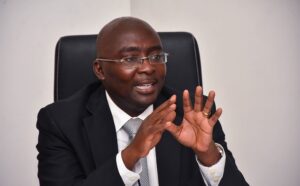Full Political Will Backing Armed Forces’ Crackdown on Illegal Mining — Defence Minister

Ghana’s Minister for Defence, Dr. Edward Omane Boamah, has restated the government’s unwavering commitment to eradicating illegal mining—commonly known as galamsey—underscoring that real political resolve, anchored at the highest level, is propelling the effort forward.
Speaking at the Government Accountability Series press briefing held at Jubilee House, Dr. Boamah gave a detailed account of the role being played by the Ghana Armed Forces (GAF) in executing the nationwide anti‑galamsey campaign. “We are not out of the woods yet as a nation, but there is hope because there is political will at the very top,” he asserted, noting that the GAF has spearheaded operations to reclaim forest reserves and enforce discipline on ground efforts.
A Broader and Smarter Strategy
Dr. Boamah revealed that the government has conducted a full-scale review of its anti‑galamsey strategy to ensure greater coordination and sustainability. One major outcome is the creation of the National Anti‑Illegal Mining Operations Secretariat (NAIMOS)—a centralised body formed to streamline and oversee all aspects of the fight against illegal mining.
This body, inaugurated in late June 2025 with the participation of the Lands and Interior Ministries and the Defence Ministry, serves as an intelligence-led control centre coordinating actions across all 16 regions. To Dr. Boamah, this shift marks a critical departure from ad‑hoc operations toward a proactive, systematic, and data-driven model of enforcement.
Highlighting a more holistic approach, Dr. Boamah emphasised that combating galamsey must extend beyond mere militarisation. He advocated for social interventions—especially community engagement and support for alternative livelihoods—to reduce incentives for participation in illegal mining.
Providing sustainable job opportunities, he noted, would reduce numbers on the ground and ease pressure on security forces. Complementing this, he laid out plans to deploy armed drones—unmanned aerial vehicles equipped with surveillance and enforcement capabilities—to improve real-time intelligence while minimizing risks of corruption or human compromise.
Dr. Boamah gave credit to the Ghana Armed Forces for leading successful operations reclaiming forest reserves previously inaccessible due to entrenched mining activity. These efforts represent concrete progress in environmental reclamation and reflect the military’s central role in restoring national patrimony.
He also mentioned the strategic collaboration in Operation Halt II, where the Ghana Navy joined land forces to combat illegal mining along the Ankobra River—an area heavily polluted and degraded by prolonged galamsey activity.
Dr. Boamah underscored that protecting the environment is not simply an ecological concern but a matter of national security and development policy. He reaffirmed that illegal mining threatens Ghana’s natural resources and sustainable development goals, stressing that the government sees galamsey as a pressing priority for the country’s future prosperity.
Under Dr. Boamah’s leadership, Ghana is pursuing a multi‑dimensional strategy to end illegal mining—one that blends political determination, military coordination, community development, and modern technology. The creation of NAIMOS, coupled with armed drone deployment and enhanced community programming, reflects a sophisticated framework that moves beyond purely reactionary tactics.
Risk remains, but with clear leadership, systemic coordination, and robust environmental protection commitments, the government is signaling that the galamsey menace may finally meet its match.





